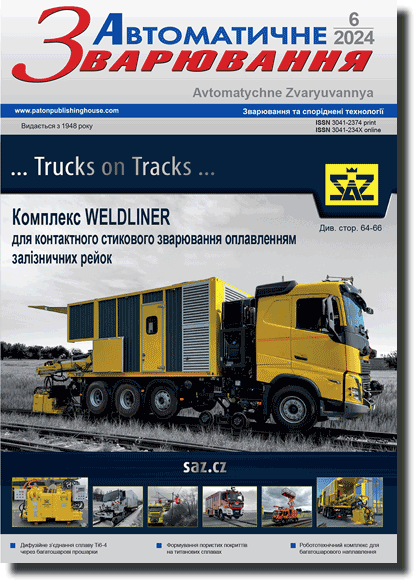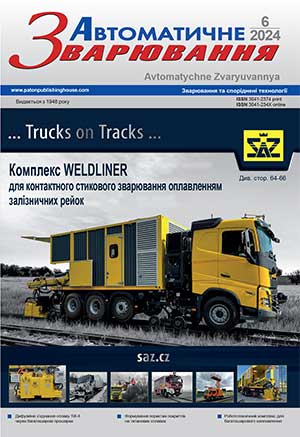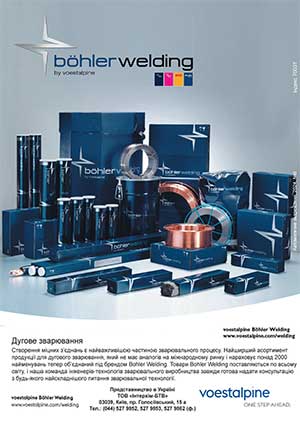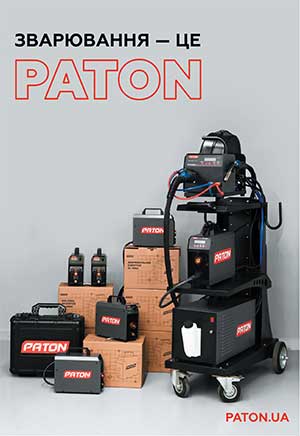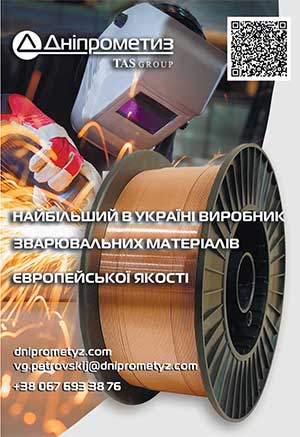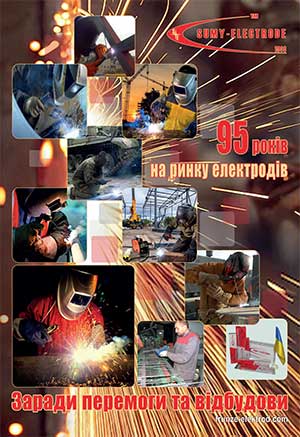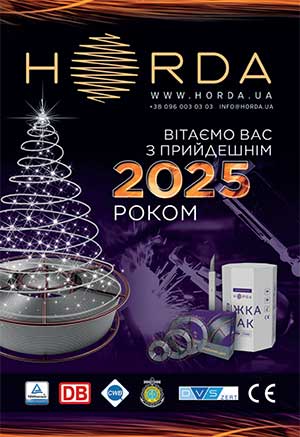| 2024 №06 (06) |
DOI of Article 10.37434/as2024.06.07 |
2024 №06 (08) |
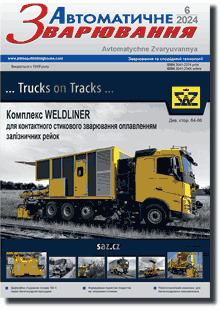
"Avtomatychne Zvaryuvannya" (Automatic Welding), #6, 2024, pp. 43-50
Robotic complex for multilayer surfacing by periodic arc and control of surface defects of the deposited metal
E.V. Shapovalov, A.S. Novodranov, V.M. Vashchenko, O.M. Savytskyi, F.S. Klishchar
E.O. Paton Electric Welding Institute of the NAS of Ukraine. 11 Kazymyr Malevych Str., 03150, Kyiv, Ukraine. E-mail: artur19940731@gmail.comThe paper considers the peculiarities of using a robotic complex based on the anthropomorphic robot Fanuc ARC Mate 100iC/7L for the implementation of multilayer surfacing with a periodic arc. It has been shown that although the inverter welding current source Fronius TPS 320i, according to its technical characteristics, cannot provide a periodic reduction in the arc thermal power to zero at a frequency of 0.2...0.5 Hz, the technological capabilities of the robot, with appropriate programming, are capable of providing a pulsed arc process in the specified frequency range. In addition, the robot, equipped with a machine vision system, allows testing for surface defects during the cooling of the next deposited metal layer. The macrosections and metallographic tests showed the high quality of the deposited metal formation. In the deposited metal, an almost monolithic fine-grained structure (8...10 grain numbers) with high impact strength and ductility at a sufficiently high strength is formed. The above indicates the expediency of using robotic systems for multilayer surfacing and the implementation of 3D technologies using arc welding in shielded gases. 14 Ref., 5 Tabl., 6 Fig.
Keywords: 3D technology, periodic arc, metal structure, machine vision system, robotic complex
Received: 28.06.2024
Received in revised form: 22.07.2024
Accepted: 13.09.2024
References
1. ASTM-International, ASTM Standard F2792-12 (2012) Standard Terminology for Additive Manufacturing Technologies.2. Anuj V. Dongaonkar, Rajesh M. Metkar (2019) Reconstruction of damaged parts by integration reverse engineering (RE) and rapid prototyping (RP). In: 3D Printing and Additive Manufacturing Technologies, 159-171. https://doi.org/10.1007/978-981-13-0305-0_14
3. Shah A, Aliyev R, Zeidler H, Krinke S. (2023) A review of the recent developments and challenges in wire arc additive manufacturing (WAAM) process. J. Manuf. Mater. Process, 7, 97. https://doi.org/10.3390/jmmp7030097
4. Rodrigues, T.A.; Duarte, V.; Miranda, R.M.; Santos, T.G.; Oliveira, J.P. (2019) Current status and perspectives on wire and arc additive manufacturing (WAAM). Materials, 12, 1121. https://doi.org/10.3390/ma12071121
5. Gulyaev, A.P. (1966) Metal research. Moscow, Metallurgiya [in Russian].
6. Paton, B.E. (1974) Electric fusion welding technology. Moscow, Mashinostroenie [in Russian].
7. Shorshorov, M.Kh. (1965) Metal science of welding steel and titanium alloys. Moscow, Nauka [in Russian].
8. Dudko, D.A., Savitsky, A.M., Vasiliev, V.G., Novikova, D.P. (1996) Features of structure and properties in welded joints formed with thermal cycling. Avtomatich. Svarka, 2, 6-7 [in Russian].
9. Dudko, D.A., Savitsky, A.M., Savitsky, M.M., Polikarpov, V.F., Savitsky, V.L. (1999) Restoration of railway switch points by surfacing with a complex thermal cycle. Avtomatich. Svarka, 12, 46-49 [in Russian]. https://doi.org/10.17816/JOWD88061
10. Dudko, D.A., Savitsky, A.M., Savitsky, M.M., Oleynik, E.M. (1998) Features of thermal processes during welding with thermal cycling. Avtomatich. Svarka, 4, 8-12 [in Russian].
11. Wagner, F.A. (1980) Equipment and methods of pulsed arc welding. Moscow, Energiya [in Russian].
12. Wagner, F.A., Stepanov, V.V. (1968) Selection of pulsed arc welding mode parameters and their influence on the properties of welded joints. Avtomatich. Svarka, 5, 14-16 [in Russian].
13. Wagner, F.A. (1980) Thermal cycling when welding with a tungsten electrode. Svarochn. Proizvodstvo, 2, 4-6 [in Russian].
14. Sorokin, V.G. (1989) Data base of steels and alloys. Moscow, Mashinostroenie [in Russian].
Advertising in this issue:
The cost of subscription/purchase order journals or individual articles
| Journal/Currency | Annual Set | 1 issue printed |
1 issue |
one article |
| TPWJ/USD | 384 $ | 32 $ | 26 $ | 13 $ |
| TPWJ/EUR | 348 € | 29 € | 24 € | 12 € |
| TPWJ/UAH | 7200 UAH | 600 UAH | 600 UAH | 280 UAH |
| AS/UAH | 1800 UAH | 300 UAH | 300 UAH | 150 UAH |
| AS/USD | 192 $ | 32 $ | 26 $ | 13 $ |
| AS/EUR | 180 € | 30 € | 25 € | 12 € |
| SEM/UAH | 1200 UAH | 300 UAH | 300 UAH | 150 UAH |
| SEM/USD | 128 $ | 32 $ | 26 $ | 13 $ |
| SEM/EUR | 120 € | 30 € | 25 € | 12 € |
| TDNK/UAH | 1200 UAH | 300 UAH | 300 UAH | 150 UAH |
| TDNK/USD | 128 $ | 32 $ | 26 $ | 13 $ |
| TDNK/EUR | 120 € | 30 € | 25 € | 15 € |
AS = «Automatic Welding» - 6 issues per year;
TPWJ = «PATON WELDING JOURNAL» - 12 issues per year;
SEM = «Electrometallurgy Today» - 4 issues per year;
TDNK = «Technical Diagnostics and Non-Destructive Testing» - 4 issues per year.




